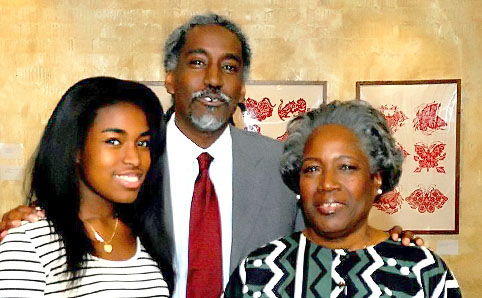Latest News Archive
Please select Category, Year, and then Month to display items
19 November 2018
|
Story Charlene Stanley
|
Photo Charlene Stanley
 Prof John Mubangizi, Dean of the Faculty of Law, encouraged delegates at the Fifth Annual International Mercantile Conference to share ideas on best international practice in their various fields.
Prof John Mubangizi, Dean of the Faculty of Law, encouraged delegates at the Fifth Annual International Mercantile Conference to share ideas on best international practice in their various fields.
“Don’t say anything online that you wouldn’t want plastered on a billboard with your face on it.”
This famous quote by international tech expert Erin Bury should be a guiding light when it comes to online habits in the workplace, according to Francois Cilliers, UFS Lecturer in Mercantile Law.
In his presentation Could Social Media be the Gateway to Employment Discrimination? he warned that employees have a responsibility not to bring their employers in disrepute through their comments on social media.
“Posts, updates, tweets, and comments are considered to be publications and can therefore never be seen as privileged information,” he explained.
Responsibility on employees and employers alike
He pointed out that employers also had a responsibility regarding the way in which they use the information about prospective employees obtained via social media.
“Nowadays, approximately 75% of companies hire through social media. In the US, recruiting companies spend hours researching candidates, making full use of what they can find on social media. It was found that 50–80% of employers frowned upon posts and pictures featuring drug and alcohol abuse, profanity, and bad grammar.”
He warned that employers needed to tread lightly, as a decision not to employ someone as a result of information on the prospective employee’s political views and sexual orientation could constitute unfair discrimination as set out in the Employment Equity Act.
“An employer who wishes to use a screening process (utilising social media) has to prove that the information and the process is objectively necessary and can be justified with reference to the inherent requirements of the job,” he explained.
“As technology and electronic systems advance, so too should the applicable labour laws.”
Cilliers’ presentation formed part of the Fifth Annual International Mercantile Law Conference recently hosted by the Faculty of Law on the Bloemfontein Campus.
Incorporating new technology in teaching and research
“This conference is an opportunity to share ideas on best practice in what is perceived as a ‘difficult’ field within Law,” said Prof John Mubangizi, Dean of the Faculty of Law, as he opened the proceedings. Topics in the discussion sessions ranged from Racism in the workplace and The underrepresentation of females in the judiciary, to Decriminalisation of cannabis: A recipe for healthy employer-employee relations?
“Conferences such as these help us to take advantage of the newest developments in technology to advance our teaching and research,” said Prof Mubangizi.
“To quote Einstein: ‘We can’t solve problems by using the same kind of thinking we used when we created them.’”
US professor makes the case for public scholarship
2011-08-17
|

|
| The Eatman family from the left: Jasmin Eatman, Prof. Timothy Eatman and Mrs. Lorraine Eatman |
The university of the 21st century should not be an ivory tower; rather it should work with communities to co-create things of public value. This was one of the observations made by visiting US Prof. Timothy Eatman. He delivered a public lecture on the topic Public Scholarship and the democratisation of knowledge in the engaged university at the University of the Free State (UFS) on Monday, 15 August 2011. Prof. Eatman challenged people at the lecture to think about richer ways of thinking about engaged public scholarship and said they need to prepare for a new citizenry of academia.
Prof. Eatman, an assistant professor of Higher Education at Syracuse University in the United States, said that knowledge was revealed in diverse ways and advised institutions of higher education to demonstrate an increasing sensitivity to issues of relevance to public good. Prof. Eatman said the present era calls for the development of a more sophisticated understanding of knowledge creation.
Prof. Eatman, who is visiting our country for the first time, brought along his mother, Lorraine, and daughter, Jasmin, who performed a contemporary dance during the event. The family had been in Bloemfontein for the past week or so and Eatman expressed his gratitude to staff and people of Bloemfontein, saying he can deliver personal testimony to the beauty of the Free State.